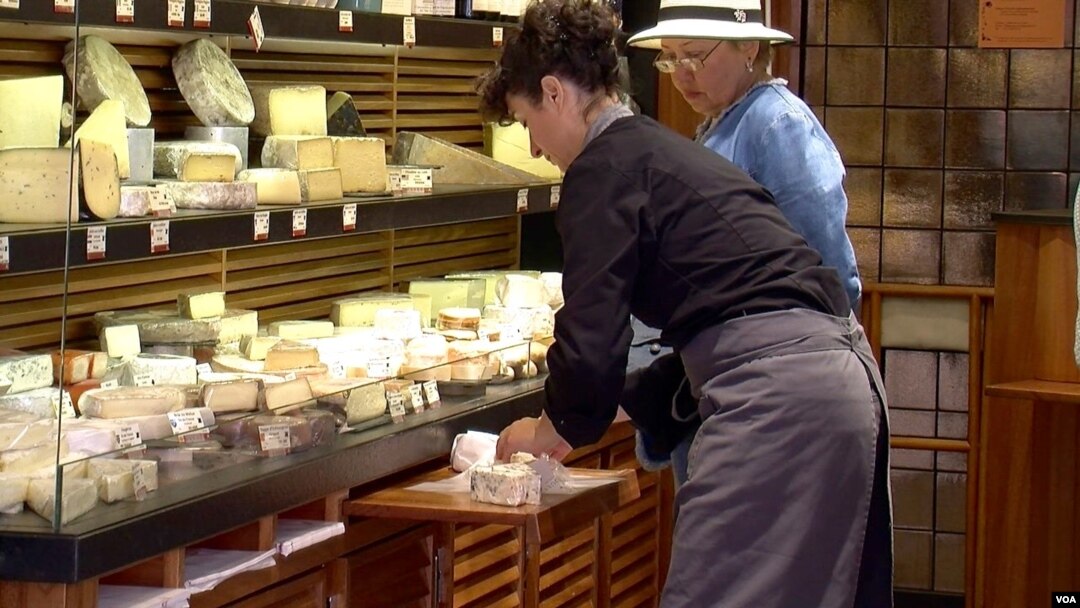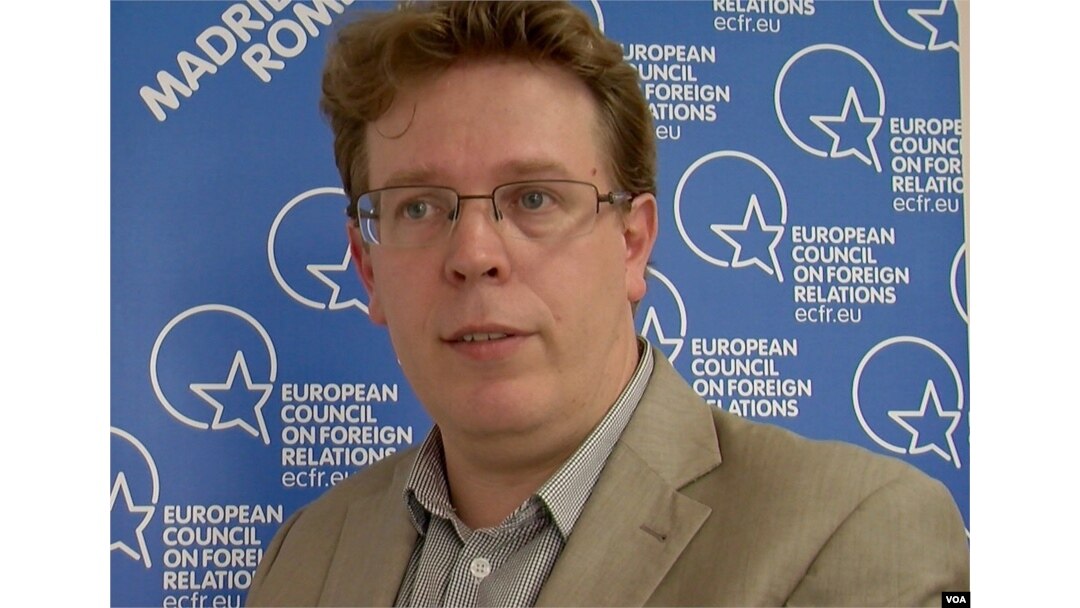Morning sunlight bounces off wedges of cantal and fat rounds of Camembert at the renowned Androuet cheese store in southern Paris.
The shop sells products from all parts of the world - even a Wisconsin cheddar with a coffee-scrubbed rind and a nutty flavor - but its specialty is French cheese, and the variety available is widely considered the finest in the country.
“People love that cheese,” manager Emmanuel Monnoyeur says of the Wisconsin cheddar. “They’re laughing of course, because it’s American cheese. But when they taste it, they find it’s very interesting.”
Married to an American, Monnoyeur can gently poke fun at cheese tastes on both sides of the Atlantic. But when it comes to free-trade talks, the stakes are no laughing matter.

Wrapping up cheese at Androuet, one of France's leading cheese stores. (L. Bryant/VOA)
“We’re afraid of an accord with America,” he says. “We have to protect our French products.”
Feelings of dismay and outright revolt have spilled onto European streets in recent days, ahead of key European Union trade talks Friday in Slovakia.
March against TTIP
In Germany, Austria and in Brussels, where the EU is headquartered, hundreds of thousands of people have marched against the Trans-Atlantic Trade and Investment Partnership (TTIP) between Europe and the United States that would create the world’s largest free-trade zone, with 850 million customers.
“People are afraid of the consequences,” says Manuel Lafont Rapnouil, head of the Paris office of the European Council on Foreign Relations, an independent think tank. “They know there will be losers, and they’re afraid they’ll be on the losing side, and not on the winning side.”

Analyst Manuel Lafont Rapnouil says EU leaders do not want just any trade deal. (L. Bryant/VOA)
The trade deal aims to end restrictive tariffs and regulatory barriers on a raft of goods and services, create hundreds of thousands of jobs, and grow economies on both sides of the Atlantic.
For supporters, the windfall would be a boon for European economies still struggling to emerge from a decade of financial crisis.
“As a European, I could have good reason to oppose the TTIP,” Laurence Parisot, former head of France’s MEDEF employers’ union, wrote in an editorial. “But ... I observe with concern the stagnation of our economy, the difficulty to create employment, the incapacity to achieve a single market, the delays in innovation.”
Critics contend the price is too high. As negotiations stand, they argue, a deal with the U.S. would erode European health and environmental standards and attack the very identity of specialized European products such as Parma ham, feta cheese and French Champagne.
The divisions are felt not only in French shops, but also in many other EU member states ahead of the new round of trade talks with Washington.
Cheeses at a market near Les Halles in Paris. (L. Bryant/VOA)
'No political support'
While more than a dozen EU countries are pushing for a deal before U.S. President Barack Obama leaves office next January, France is calling for a halt in negotiations.
“There is no political support from France for those negotiations,” French Trade Minister Matthias Fekl said in a radio interview last month. He complained that U.S. negotiators “give nothing, or just crumbs,” and called for a fresh start to talks.
In Germany, Chancellor Angela Merkel has backed the talks. But Vice-Chancellor Sigmar Gabriel, whose center-left Social Democratic Party is part of the coalition government, has called the talks a failure.
“One of the key questions for European governments is not whether they should do free trade or not,” says Lafont Rapnouil of the European Council. “Rather the challenge is how do they prepare best for that more open economy? How do they prepare their economy to make the most out of the new commercial ties?”
For the toughest critics, there is little to discuss. Naysayers fear the U.S. trade deal and a similar pact with Canada will lower wages and put currently banned genetically modified foods on European dinner plates.
“We don’t want to develop our economy if this growth puts our environment and our health in danger,” says Jean-Francois Julliard, executive director of Greenpeace France. “We have to keep a balance.”
Jean-Francois Julliard of Greenpeace France says a trade pact will erode European health and environmental standards. (L. Bryant/VOA)
Leaked documents
Earlier in the year, Greenpeace claimed that leaked documents from the talks suggest the U.S. is trying to water down standards for potentially risky products. The European Commission, the EU executive arm charged with negotiating a deal, denies any effort to lower the bloc’s standards.
Linked to those concerns are another set of worries: that specialized foods and spirits will lose protective labeling. Known in France as AOP (Protected Appellation of Origin), the designation defines standards of origin and fabrication for products such as Roquefort cheese, whose origins stretch back centuries.
“It’s a very dangerous treaty for our cheeses,” says Veronique Richez-Lerouge, president of Fromages de Terroirs, an association that lobbies on behalf of small cheese producers. “AOP is about tradition, history, testing, quality — everything about the cheese.”
French cheese makers are fighting to preserve AOP labels, like this one for camembert. (L. Bryant/VOA)
European critics also point to other problems. They claim, for example, that the talks don’t address vast sectors of the American market, such as construction, transportation and energy, which largely remain closed to European competition.
Time is running out to strike a deal by year’s end.
“The U.S. argument is to have a deal now, because later may be never,” Lafont Rapnouil says, noting a deal may have less chances of passage under the next American president and Congress.
But some European governments are sending a counter-message.
“We want a good deal,” he says, summing up their argument. “And if we don’t get a good deal, we won’t take it.”

